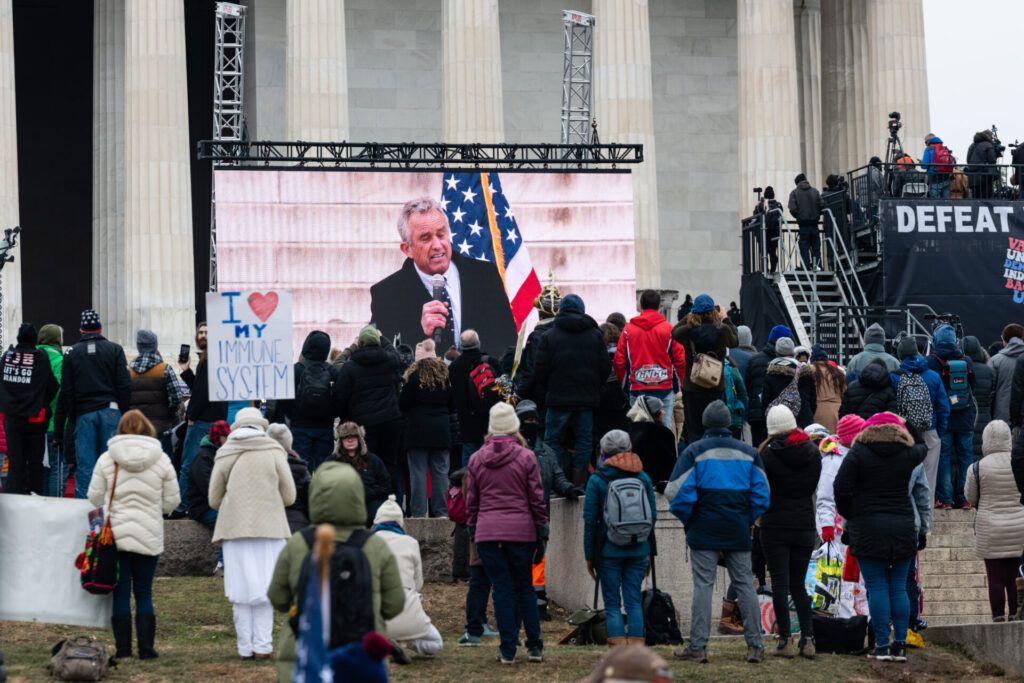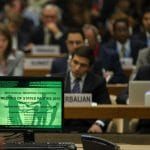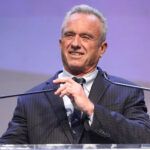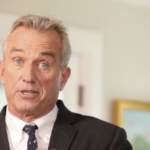Lysenko, Mbeki, and RFK Jr.: Leaders who shun science will face predictably bad results
By Georgios Pappas | November 27, 2024
 Demonstrators listen as Robert F. Kennedy Jr. speaks on a screen during an anti-vaccine mandate rally in 2022. Credit: Eric Lee/Bloomberg via Getty Images.
Demonstrators listen as Robert F. Kennedy Jr. speaks on a screen during an anti-vaccine mandate rally in 2022. Credit: Eric Lee/Bloomberg via Getty Images.
Robert F. Kennedy Jr., President-elect Donald Trump’s pick to head the Department of Health and Human Services, has sparked scientific and public concern with his pseudoscientific and often conspiratorial public comments and actions. Kennedy would take the helm of US government health agencies as someone who has said there is no safe vaccine, who believes in debunked COVID treatments, who hopes to fire scores of health officials, and who wants to direct the country away from critical infectious disease research.
Unfortunately, history provides some lessons as to what can happen when leaders turn their backs on the science necessary to address societal challenges.
In South Africa, as the country grappled with the AIDS epidemic more than 20 years ago, the country’s president and his health minister embraced figures who denied that human immunodeficiency virus, or HIV, caused AIDS. They gave a platform to pseudoscience and hawkers of vitamins and natural remedies instead of promoting the research and pharmaceutical treatments necessary to thwart the disease.
But perhaps the most grievous example of a government shunning scientific research and scientists came in form of the Soviet agronomist Trofim Lysenko, who did not believe in the emerging principles of genetics and who, as he promoted his pseudoscientific agricultural methods, helped to perpetuate and exacerbate famines that plagued the Soviet Union and led to millions of deaths.
What will the United States look like under health and science policy set by Trump and Kennedy? History is never an exact predictor of the future, but Lysenko’s Soviet Union and Thabo Mbeki’s South Africa show that unscientific policy making can have far-reaching negative consequences.
Revolutionary anti-science. The early decades of the 20th century saw a blossoming of the field of genetic science, in part due to the resurfacing of the ideas of Gregor Mendel. Mendel, a 19th century Austrian monk, had shown how dominant and recessive traits could be passed down through successive generations of organisms in predictable ways. Though largely ignored for decades, the concept of Mendelian inheritance underpinned the new research area of genetics.
And during the 1920s and 1930s, Soviet biologists and geneticists led the world in genetic science: Nikolai Koltsov, a father figure of the Soviet genetics community, had already imagined the structure of DNA 26 years before James Watson and Francis Crick demonstrated it. Nikolai Vavilov pursued a dream project of building a world seed bank. Soviet scientists travelled abroad to participate in scientific conferences and to work in foreign laboratories. American and European geneticists also visited the Soviet Union.
These scientists and their budding studies into the genetic characteristics of traits were an awkward ideological fit for the regime of Vladimir Lenin, who came to power after the revolution of 1917. The scientists had been born and educated under Tsarist rule and typically came from bourgeois families. For the public relations purposes of Soviet communism, they did not represent the ideal new Soviet man—a proletarian selflessly devoted to excelling and thereby strengthening and promoting the communist state.
There was another pressing issue for Soviet leaders: the turbulent decades of the early 20th century had led to a food crisis. The quick succession of World War I, a revolution against the ruling Russian Tsars, the communist takeover, and a period of draught led to the 1921-1922 famine, which killed about 5 million in the Soviet Union. Later on, the Soviet government collectivized agriculture and set hyper-ambitious targets of crop production. Local leaders tried to achieve them at any cost to gain recognition, confiscating every plot of land they could and thus leading to brutal famines in the country. In the early 1930s, Holodomor, the name for a devastating famine centered in Soviet Ukraine, killed more than 5 million people overall (although some scholars argue that authorities deliberately exacerbated the crisis to punish Ukrainian resistance to Soviet rule). Any scientist who could implement (or at least plainly promise) solutions to the famine was to become popular with the regime. Enter Trofim Lysenko.
Unlike the upper crust geneticists who would eventually become his enemies, Lysenko was the embodiment of a Soviet man of science. Young and from a humble peasant family, the agronomist was trained in the years after the 1917 communist revolution. Importantly, Lysenko also claimed that he had found a method to create cold-resistant seeds that could thrive in the climate conditions of the Soviet Union. After the official regime newspaper Pravda took note of Lysenko’s experimentation in 1927, Lysenko’s career took off. He soon found his way in the inner circle of Vavilov, the genetic scientist who led two prominent institutes, the Institute of Genetics of the USSR Academy of Sciences and the Lenin All-Union Academy of Agricultural Sciences, until he fell out with the Soviet leadership in the mid-1930s.
By then, when the ambitious Lysenko sought greater influence, he understood that the cosmopolitan, bourgeois scientists who approved Mendel’s hereditary laws and who were often abroad could be re-imagined—as enemies of the state. With Hitler and the Nazis ascendent, the emerging Western canon of genetic science was at times misleadingly tied to Nazi ideas about eugenics.
But Lysenko needed a theory he could use to attack Mendel’s principles. He coined Michurinism, named after Ivan Vladimirovich Michurin, an agriculturist with a successful record in plant hybridization. At the Lenin All Union Academy of Agricultural Sciences, where Lysenko was director from 1938-1956, Lysenko and his allies held debates between the “Michurians” and “Mendelians.” The Michurian idea—that acquired characteristics could be inherited, contrary to the Mendelian logic of genes—began to take hold.
Put simply, a believer in Michurinism might hold the idea that “if I build strong muscles by constant exercise in the gym, my offspring will also have strong muscles.” The theory fit perfectly with the narrative of a new Soviet man—a man who could be galvanized to achieve a perfection that could be seeded in the generations to come.
During Soviet leader Joseph Stalin’s infamous purges of political opponents in the late 1930s, Lysenko’s opponents, the Mendelian geneticists, perished. Vavilov was arrested and died in exile in 1943. Koltsov died “unexpectedly” in 1940, supposedly of a stroke, though some suspect he was poisoned by Soviet police. The leading physician and geneticist Solomon Levitt was arrested and executed in 1938. Other scientists went into exile, were sentenced to prison, or were blacklisted from their professions.
After a decisive 1948 meeting of the Lenin All-Union Academy of Agricultural Sciences, which included hundreds of agronomists and other experts, Lysenko triumphed. His beliefs were cemented into party doctrine: The study of Mendelian genetics was banned.
Lysenko continued to dominate the field of agriculture, genetics, and biology through the Nikita Khrutshev years. It wasn’t until the mid-1960s that his influence in the Soviet Union began to wane, following an extensive investigation by academic Andrei Sakharov, later a leading dissident and Nobel prize laureate, who demonstrated the absence of any persuasive documentation of Lysenko’s “achievements.”
Lysenko’s “legacy” is one of violent debasement of a leading generation of scientists, ideology imposed on scientific principles. And his impact was widespread. Mao’s China adopted Lysenko’s views in an “agricultural constitution,” leading to the Chinese famine of 1959-1961 and a death toll of at least 15 million. Western communist scientists and intellectuals had a hard time dealing with their dual loyalties. Louis Aragon, the French writer, unfortunately compared Lysenko to Galileo. Hans Stubbe, the East German crop scientist, systematically attempted to find evidence for Lysenko’s theories, but all his experiments spectacularly failed.
The South African president versus 5,000 scientists. By the mid 1990s, after much research and the development of beneficial therapies, the medical community had reached a scientific consensus: the HIV virus caused AIDS. Even so, a small number of scientists, often billed as HIV “dissidents,” expressed doubt that the virus was responsible, instead arguing that AIDS was caused by decadent living, malnutrition, and recreational drug use.
AIDS was a huge problem in South Africa by 2000; 25 percent of adult deaths were attributable to the disease. Faced with a health crisis, South African President Thabo Mbeki, the heir to Nelson Mandela, appeared, for years, to side not with the overwhelming consensus on AIDS—the side promoting treatments and research that could extend lives and prevent the spread of the disease from mother to child—but with the HIV denialist faction.
Mbeki created a committee to discuss approaches to dealing with the disease that included notorious supporters of HIV denial such as Peter Duesberg, a US microbiologist who wrote a book called Inventing the AIDS virus. Mbeki’s approach created a platform for even the most fringe pseudoscientific or plainly outrageous opinions to be treated equally with scientific data and principles. At an international AIDS conference in Durban, South Africa in 2000, Mbeki told attendees that he had convened experts who “differed bitterly” but had “graciously agreed to join together to help us find answers to some outstanding questions.”
Even after 5,000 leading scientists and others signed on to a detailed letter in Nature on the evidence that HIV causes AIDS—noting, for example, that people receiving HIV infected blood products develop AIDS, while people who receive untainted blood do not—Mbeki continued to cast doubt on the scientific consensus on AIDS and downplay its lethal toll.
Mbeki’s intransigence led South Africa to have a far worse record against the epidemic than that of neighboring countries. Years of state-sponsored HIV denial in South Africa may have led to more than 300,000 “unnecessary” deaths during the 2000-2005 period. Almost 20 years later, South Africa remains one of the countries with a high incidence of annual new HIV cases, with World Health Organization (WHO) in 2021 listing HIV/AIDS as the leading cause of death for South African children aged under five.
Will the United States take an unscientific approach to health? It’s hard to ignore the Lysenko and Mbeki experiences when assessing the potential problems that could accompany the appointment of Robert F. Kennedy to a leading health policy position. Kennedy, for instance, once said 600 National Institutes of Health officials would, on day one of the Trump administration, walk in to work and walk out. Kennedy once compared COVID-19 vaccination policy in the United States to the Holocaust, arguing that Anne Frank, the teenager who wrote her famous diary before dying in a Nazi concentration camp, could “hide in an attic,” but, Kennedy told a rally crowd in 2022, “the mechanisms are being put in place that will make it so none of us can run and none of us can hide.” Lysenko attributed the actual Holocaust to supporters of Mendelian genetics.
Perhaps it is no surprise that Kennedy is helping to keep the flame of the HIV denialist movement alive, including a chapter on HIV in a 2021 book that attacks Anthony Fauci, the long-time AIDS researcher, who, as director of the National Institute of Allergy and Infectious Disease and White House advisor, became a COVID-era lightning rod. In the book, Kennedy makes the argument that all voices on the issue of HIV must be heard, citing, with approval, HIV-denialists that Mbeki embraced, while questioning whether HIV is the only cause of AIDS.
With Kennedy, Trump has chosen a populist figure, a loose cannon aimed at the bourgeoisie in industry and government who, Kennedy claims, are keeping people sick. But Trump should understand that when leaders embrace science denialism in response to a crisis, the results can be deadly and long-lasting.
Together, we make the world safer.
The Bulletin elevates expert voices above the noise. But as an independent nonprofit organization, our operations depend on the support of readers like you. Help us continue to deliver quality journalism that holds leaders accountable. Your support of our work at any level is important. In return, we promise our coverage will be understandable, influential, vigilant, solution-oriented, and fair-minded. Together we can make a difference.
Keywords: Donald Trump, Robert F. Kennedy Jr.
Topics: Biosecurity
















Georgios Pappas, may not realize that over in the United States there are a whole lot of health problems… too many to list in a comment field. All approved US food additives probably aren’t safe. Many vaccines too have been pulled… they aren’t all safe. RFK is a step in the right direction. Prevention, exercise etc has value as does nutrition. As for vaccines, covering up trials, censoring injured people on social media – these behaviors lead to populations not trusting them. Also I see rude and condescending behavior… not kindness and willingness to debate. Please have Georgios debate Kennedy… Read more »